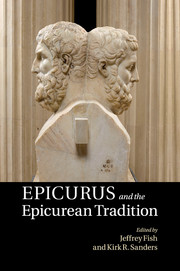Book contents
- Frontmatter
- Contents
- Acknowledgements
- Note on Abbreviations
- List of Contributors
- 1 Introduction
- 2 Autodidact and student: on the relationship of authority and autonomy in Epicurus and the Epicurean tradition
- 3 Epicurus' theological innatism
- 4 Epicurus on the gods
- 5 Not all politicians are Sisyphus: what Roman Epicureans were taught about politics
- 6 Epicurean virtues, Epicurean friendship: Cicero vs the Herculaneum papyri
- 7 Cicero's use and abuse of Epicurean theology
- 8 The necessity of anger in Philodemus' On Anger
- 9 Philodemus, Seneca and Plutarch on anger
- 10 Philodemus and the fear of premature death
- Bibliography
- General index
- Index of passages
5 - Not all politicians are Sisyphus: what Roman Epicureans were taught about politics
Published online by Cambridge University Press: 01 June 2011
- Frontmatter
- Contents
- Acknowledgements
- Note on Abbreviations
- List of Contributors
- 1 Introduction
- 2 Autodidact and student: on the relationship of authority and autonomy in Epicurus and the Epicurean tradition
- 3 Epicurus' theological innatism
- 4 Epicurus on the gods
- 5 Not all politicians are Sisyphus: what Roman Epicureans were taught about politics
- 6 Epicurean virtues, Epicurean friendship: Cicero vs the Herculaneum papyri
- 7 Cicero's use and abuse of Epicurean theology
- 8 The necessity of anger in Philodemus' On Anger
- 9 Philodemus, Seneca and Plutarch on anger
- 10 Philodemus and the fear of premature death
- Bibliography
- General index
- Index of passages
Summary
When it comes to political involvement, some of our most important sources on early Epicureanism frame the question in terms regularly employed by their Stoic rivals: ‘Will the sage engage in politics?’ Epicurus and Chrysippus apparently both discussed this question in works sharing the title On Modes of Life (Περὶ βίων). Of Epicurus' treatment we have a two-word summary: οὐδὲ πολιτεύσεται (‘and the sage will not participate in politics’). But if the question were really as simple as its traditional wording makes it seem, this answer would appear to create complications for some, especially for converts in oligarchic aristocracies. What was someone like Cassius, the tyrannicide, to do once he came to be a late-life convert to Epicureanism? On the face of it, if Epicureanism has really taken hold, he would lay down his political influence, withdraw from the larger society and live the rest of his life unnoticed with his Epicurean friends. Otherwise, if he clings to his political career and influence, and even risks his life for them, as Cassius did, we would suspect that he is just dabbling in Epicureanism. As for Epicurean philosophers, we might expect the more rigorous ones to help princes and courtiers find ways to descend from their positions of authority and influence, as Epicurus did with his friend Idomeneus, a politician from Lampsacus.
- Type
- Chapter
- Information
- Epicurus and the Epicurean Tradition , pp. 72 - 104Publisher: Cambridge University PressPrint publication year: 2011
- 7
- Cited by



